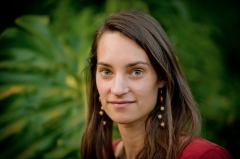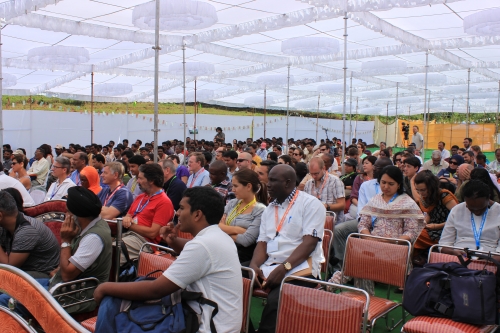 – Hi Alice, could you tell us about your career path as well as your role today within Livelihoods Networks?
– Hi Alice, could you tell us about your career path as well as your role today within Livelihoods Networks?
I have been the coordinator for Livelihoods Networks ever since July 2012. I studied to be an engineer specialized in tropical agronomy and rural development and it led me to work for a coffee-growing cooperative in Rwanda that was certified fair-trade, with organic cocoa producers in Venezuela and for the sustainability of forests planted in Congo. Through my experiences of working with coffee and cocoa producers, I was quickly confronted with the issue of agroforestry. My work with various associations gave me the opportunity to get acquainted with the dynamics of networks. After all it is not by accident that I took up the post of coordinator within Livelihoods Networks.
I manage Livelihoods Networks from the World Agroforestry Center (former-ICRAF) in Nairobi (Kenya), where I am based. One of my roles is to identify problems that project initiators are faced with in the field and to initiate a dialog with other interlocutors capable of finding a solution to their needs. I also get people to work in small groups on common themes. In some ways I act as a catalyst between the various members of the Livelihoods community.
– Who are the members of this Network and where do they come from?
The members of Livelihoods Networks work for many various organizations. Some are project developers in large or small NGOs, scientists involved in international research programs, others are in charge of sustainable development within the Fund’s business partners or technical experts… Above all, they are people that we met during the Livelihoods adventure and who share its values. Being open to others and to new practices, field knowledge and commitment are the common values shared by every member of the network.

– What is the added value of this Network in a project like the Livelihoods Fund?
The network is a platform that brings all of the Fund Project’s initiators together, as well as people outside the Livelihoods project, who also provide expertise in their fields. It enables us to mutualize efforts, economic, social and environmental innovations, in order to help every single project be viable and developed.
Here is just one example: thanks to the platform we were able to attend to a direct conversation between team members from the NEWS project in India and the Yagasu project in Indonesia, about a problematic insect infestation that was raging in mangrove plantations.
It is not only solutions and techniques that are shared and exchanged within Livelihoods Network, evaluating the various impacts of the Fund’s projects (such as planting mangrove for instance) is also done collectively. Methodologies and measure indicators are chosen by both project initiators and experts, together, and by including communities in the decision process.
– What are the expectancies of the members of such a community?
What we observe is that, despite multiple research programs and a growing knowledge gathered by scientists, there is still a wide gap between the scientific world and the knowledge it provides and those who work in the field and actually bring the projects to life. The highest expectancies are there: knowledge discovered by scientists that can be used in the field. One of the other main expectancies concerns the help that the Fund’s business partners can provide, especially when it comes to management and communication.

